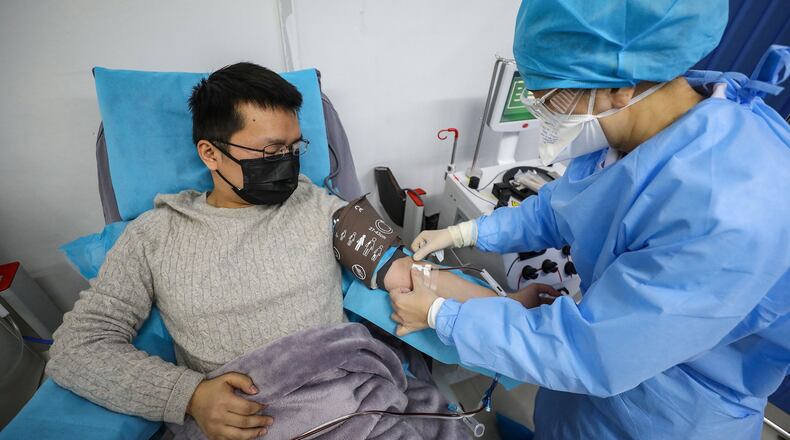“We are working to set up the program and our hope is to have it up and running by the end of the week,” Community Blood Center Medical Director Dr. James Alexander said in a statement Monday. “Once in place we will collect plasma from donors who meet the requirements. There is some evidence it may benefit some patients. There is very little evidence that it is harmful.”
Although promising, convalescent plasma has not yet been proven effective in treating COVID-19, according to the Food and Drug Administration. The agency on Friday announced a national study, led by the Mayo Clinic, that will help hospitals offer the experimental plasma therapy and track how they fare. The American Red Cross will help collect and distribute the plasma.
Coronavirus: Dayton Convention Center could treat virus patients during surge
What the history books call “convalescent serum” was most famously used during the 1918 flu pandemic, and also against measles, bacterial pneumonia and numerous other infections before modern medicine came along. That’s because when infection strikes, the body starts making proteins called antibodies specially designed to target that germ. Those antibodies float in survivors’ blood — specifically plasma, the yellowish liquid part of blood — for months, even years.
“So the concept is taking someone that they’ve survived the virus, they’ve sort of been vaccinated naturally by somehow (being) exposed to it and they’ve made antibodies, and then you can take their plasma, purify it and administer it back to people. And it’s been done with Ebola, SARs and H1N1,” said Dr. Rocco Rotello, Cedarville University associate professor of pharmaceutical sciences.
One of the challenges is in an emergency such as the outbreak, where there can be a lack of control when learning about how well the treatment works, Rotello said. Sometimes patients getting convalescent plasma are at the same time getting other therapies to treat the virus, he said.
“It’s another attempt to try to treat the condition. The only drawback is when you have emergency investigations like this, there’s sometimes a lack of control in the study,” Rotello said.
Coronavirus: If somene is sick, what should household members do?
When new diseases erupt and scientists are scrambling for vaccines or drugs, it’s “a stop-gap measure that we can put into place quickly,” said Dr. Jeffrey Henderson of Washington University School of Medicine in St. Louis, who is helping to develop a nationwide study.
This “is not a cure, per se, but rather it is a way to reduce the severity of illness,” Henderson said.
Doctors don’t know how long survivors’ antibodies against COVID-19 will persist. But for now, “they’re the safest ones on the street,” said Dr. Rebecca Haley of Bloodworks Northwest in Seattle, which is working to identify donors. “We would not be making a dent in their antibody supply for themselves.”
Community Blood Center said potential donors must meet all standard screening criteria for blood donation, plus pass additional FDA criteria, including:
• Have a prior diagnosis of COVID-19 documented by a laboratory test or doctor’s note;
• Meet current blood donation protocols;
• And their physician must determine they meet the criteria before they schedule an appointment.
Last week, the FDA told hospitals how to seek case-by-case emergency permission to use convalescent plasma, and Houston Methodist Hospital and Mount Sinai jumped at the chance.
Coronavirus: Complete Coverage
A desperate public responded as well. Families took to social media to plead on behalf of sick loved ones, and people recovering from the virus asked how they could donate. According to Michigan State University, more than 1,000 people signed up with the National COVID-19 Convalescent Plasma Project alone. Dozens of hospitals formed that group to spur plasma donation and research.
Locally, colleagues of a physician who fell ill from COVID-19 took to Facebook over the weekend asking for a plasma donor who has made a full recovery from the virus to donate to help Dr. Mukul Chandra, medical director of cardiac preventive care and research at Miami Valley Hospital. The April 4 post said the doctor was on a ventilator.
NEW: Local defense contractor devises COVID-19 face shields for anyone
One of the organizers behind the request for plasma confirmed Sunday that the information on Facebook about the local physician was accurate but did not wish to be interviewed for a story. However, late Monday afternoon organizers said they have enough plasma and don’t need anymore.
“We must all stay united and support each other in every way we can to get through the COVID-19 pandemic,” the Facebook post stated.
Associated Press contributed to this story.
About the Author
